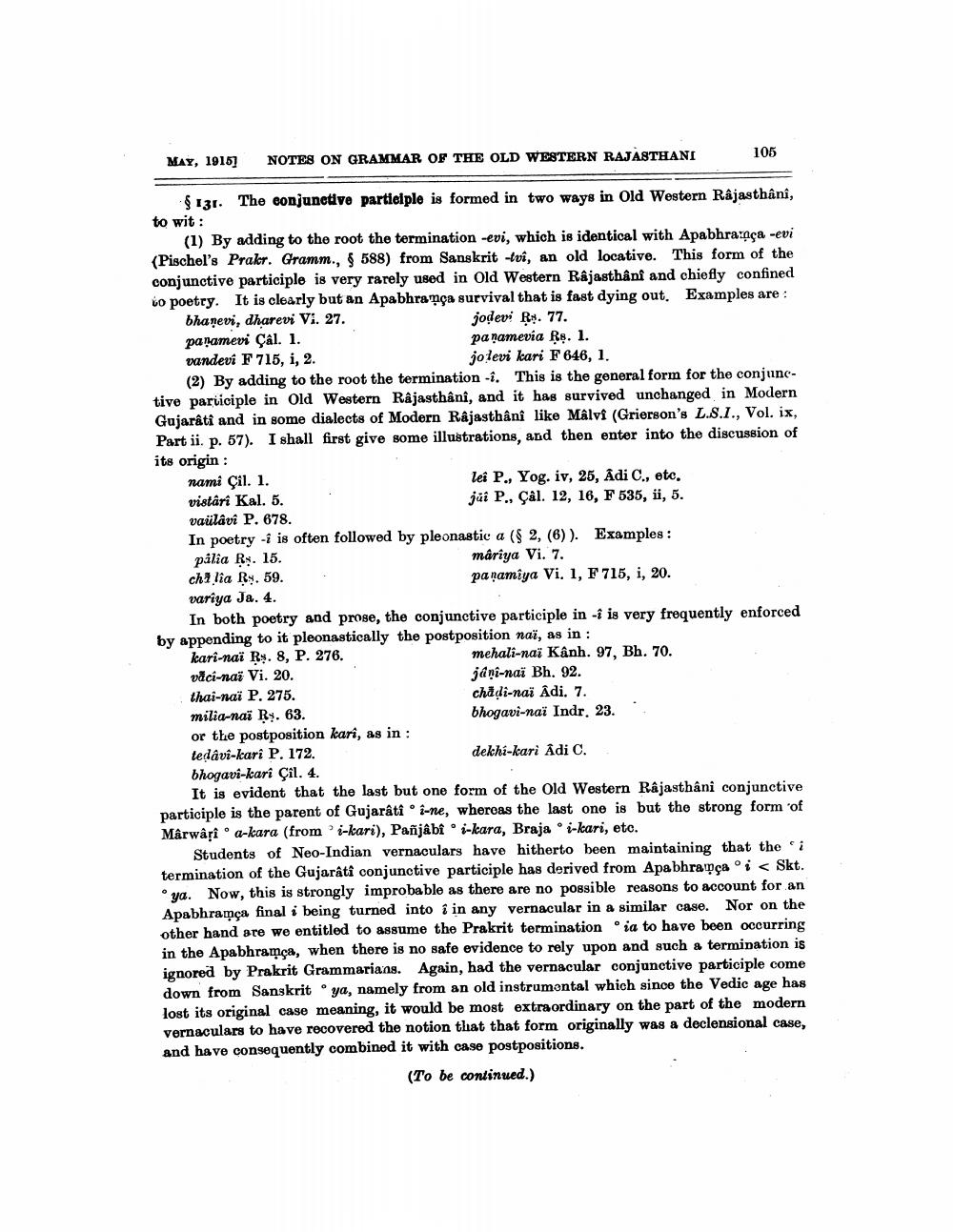________________
MAY, 1015)
NOTES ON GRAMMAR OF THE OLD WESTERN RAJASTHANI
105
$ 131. The conjunctive participle is formed in two ways in Old Western Rajasthani, to wit:
(1) By adding to the root the termination -evi, which is identical with Apabhrazaca -evi (Pischel's Prakr. Gramm., 588) from Sanskrit -tví, an old locative. This form of the conjunctive participle is very rarely used in Old Western Rajasthani and chiefly confined to poetry. It is clearly but an Apabhramaça survival that is fast dying out. Examples are : bhanevi, dharevi VI. 27.
jodevi Rp. 77. paramevi Çal. 1.
panamevia Rs. 1. vandevi F 715, i, 2.
jolevi kari F646, 1. (2) By adding to the root the termination -i. This is the general form for the conjunctive participle in Old Western Rajasthânî, and it has survived unchanged in Modern Gujarati and in some dialects of Modern Rajasthani like Målvi (Grierson's L.S.I., Vol. ix, Part ii. p. 57). I shall first give some illustrations, and then enter into the discussion of its origin: nami Çil. 1.
lei P., Yog. iv, 25, Adi C., etc. vistârî Kal. 5.
jui P., Çal. 12, 16, F 535, ii, 5. vaülavi P. 678. In poetry -1 is often followed by pleonastic a ($ 2, (6)). Examples: pália Rs. 15.
mariya Vi. 7. chilia Rs. 59.
panamiya Vi, 1, F 715, i, 20. variya Ja. 4.
In both poetry and prose, the conjunctive participle in -i is very frequently enforced by appending to it pleonastically the postposition naï, as in: kari-nai Rs. 8, P. 276.
mehali-nai Kanh. 97, Bh. 70. vici-nai Vi. 20.
jani-nai Bh. 92. thai-nai P. 275.
chädi-nai Adi. 7. milia-nai Rs. 63.
bhogavi-nai Indr. 23. or the postposition kari, as in: tedavi-kari P. 172.
dekhi-kari Adi C. bhogavi-kari Çil. 4.
It is evident that the last but one form of the Old Western Rajasthani conjunctive participle is the parent of Gujarâti o i-ne, whereas the last one is but the strong form of Mârwâți a-kara (from 'i-kari), Pañjâbfi-kara, Braja o i-kari, etc.
Students of Neo-Indian vernaculars have hitherto been maintaining that the i termination of the Gujarati conjunctive participle has derived from Apabhraçao i < Skt.
ya. Now, this is strongly improbable as there are no possible reasons to account for an Apabhramça final i being turned into i in any vernacular in a similar case. Nor on the other hand are we entitled to assume the Prakrit termination ia to have been occurring in the Apabhramça, when there is no safe evidence to rely upon and such a termination is ignored by Prakrit Grammariang. Again, had the vernacular conjunctive participle come down from Sanskrit ya, namely from an old instrumontal which since the Vedic age has lost its original case meaning, it would be most extraordinary on the part of the modern vernaculars to have recovered the notion that that form originally was a declensional case, and have consequently combined it with case postpositions.
(To be continued.)




